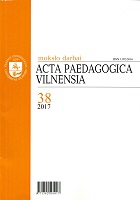Multiculturalism and Interculturalism as the Points of Reference for Teaching Competencies
Multiculturalism and Interculturalism as the Points of Reference for Teaching Competencies
Author(s): Alicja SzerlągSubject(s): Vocational Education, Migration Studies, Ethnic Minorities Studies, Identity of Collectives
Published by: Vilniaus Universiteto Leidykla
Keywords: Multiculturalism; cultural identity; interculturalism; cultural borderland; cross-cultural education; teaching competencies;
Summary/Abstract: Multiculturalism is a cultural category typical of the present times, locating the individual within the borderlands of cul-tures, i.e., in a place of experiencing not only one’s own self and own culture, but also the relation with Others and their cultures. Thus, this is a place of constant choices and cultural identifications, conceptualizing the process of developing multidimensional cultural identity and establishing a community in these cultural borderlands. The frontier character of an individual’s functioning exposes the category of inter-culturalism by entailing its typical competencies, i.e., social (per-sonal, interpersonal, cross-cultural) and civic ones. The acquisition of such features by the young generation is subject to intentional educational influences, carried out, among others, within the framework of the cross-cultural education. Therefore, the importance is assigned to the role of the teacher and his/her professional competencies (personal, interpre-tative- communicative, creative-critical, cooperation, axiological, teleological and executive), shaped within academic education.
Journal: Acta Paedagogica Vilnensia
- Issue Year: 2017
- Issue No: 38
- Page Range: 77-89
- Page Count: 13
- Language: English

